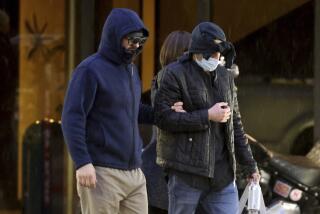Brezhnev Directly Linked to Uzbek Corruption
- Share via
MOSCOW — The late Soviet leader Leonid I. Brezhnev was directly linked for the first time Monday with widespread political corruption in the Soviet Central Asian republic of Uzbekistan.
Brezhnev, the Communist Party leader from 1964 until his death in 1982, was accused in a detailed account in the government newspaper Izvestia along with the late Nikolai V. Podgorny, who was then the Soviet president, of preventing the prosecution of an Uzbek official on bribery charges. Podgorny was president from 1965 until he was succeeded in 1977 by Brezhnev, who retained his post as party general secretary.
Although Communist Party investigators had compiled nine volumes of evidence against her, Yagdar S. Nasriddinova, former president of the Uzbek republic and vice chairman of the Supreme Soviet, the national Parliament, was let off with a party reprimand, Izvestia reported.
This was the first time that Brezhnev was linked by name to the widespread corruption in Uzbekistan, although his son-in-law, Yuri M. Churbanov, who was the first deputy minister of interior, is now on trial here with eight Uzbek police officials on corruption charges.
Nasriddinova continues to live in Moscow in an official government apartment with extensive privileges. The lengthy account of her case in Izvestia appears to signal a widening of the corruption probe, but focusing at the same time on those close to Brezhnev through the 1970s.
While she was president of Uzbekistan from 1959 to 1970, Nasriddinova granted pardons to dozens of people convicted of embezzlement, bribery and other crimes, according to the lengthy report in Izvestia, and became the target of an intensive investigation by the party’s watchdog control committee.
In March, 1976, the control commission under its chairman, the late Arvid Y. Pelshe, a member of the party’s ruling Politburo, moved to bring her to justice, recommending her expulsion from the party and her indictment on criminal charges.
The investigation found that Nasriddinova had “systematically committed illegal actions by interfering in the work of legal and investigatory bodies” in Uzbekistan, pardoning 59 major criminals after their convictions on charges of corruption, embezzlement, bribery and other crimes.
Bribes of Jewelry
The commission heard testimony, backed by other evidence, of extensive bribe-taking--amounts that ranged up to $72,000 at a time--and witnesses told of giving her gold jewelry worth $70,000 and a diamond ring worth $10,000 to secure the acquittal of relatives charged with corruption.
The party control commission decided to expel Nasriddinova from the party--the maximum penalty it could impose--and to recommend criminal prosecution. The next day, however, its recommendation was not only rescinded but reversed.
The reason, says Izvestia, was the personal intervention of both Brezhnev and Podgorny.
“One can imagine what an avalanche, and from what heights, struck the control commission, since literally on the next day it had to scrap its decision,” Arkady Sakhnin, a prominent investigative journalist, writes in a lengthy account of the affair. “Telephone law showed itself in all its ugliness.”
Brezhnev telephoned members of the committee to demand that they “stop torturing her,” according to Sakhnin.
Podgorny “literally lunged at” Pelshe during a meeting, he adds.
And Nikolai Shcholokov, the interior minister and Brezhnev confidant, intervened even more forcefully to prevent Nasriddinova’s prosecution, according to Sakhnin.
“While Nasriddinova allowed herself to interfere in the work of juridical bodies, actually revoking sentences of the Supreme Court of Uzbekistan, so Podgorny and Brezhnev allowed themselves to intervene in her criminal case,” Izvestia said.
Despite the charges against her, Nasriddinova was permitted to retire and now “enjoys the full honors of a personal pensioner of national significance,” a privileged status in the Soviet Union entitling her to a large Moscow apartment, a government country house, chauffeur-driven car and other perquisites.
“The kindness of Leonid Ilyich was also extended to other people,” Sakhnin says of Brezhnev, implying that other Uzbek officials have gone unpunished in the republic’s continuing corruption scandal.
“Thirteen years ago, criminal proceedings were opened against Nasriddinova, and the case has never been closed,” the paper said. “Three years have passed since 1985 (when President Mikhail S. Gorbachev came to power)--isn’t it time to close the case?”
More to Read
Sign up for Essential California
The most important California stories and recommendations in your inbox every morning.
You may occasionally receive promotional content from the Los Angeles Times.










